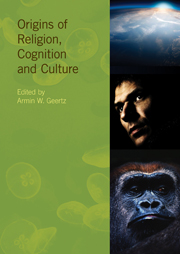Introduction
Summary
It has often been said that the origins of religion, cognition and culture are beyond the ken of modern man. And yet, it is the most interesting, challenging and provocative of topics in the natural and human sciences. Perhaps our origins are no longer as murky today as in previous centuries. The past twenty-five years have startled the world with major advances in a number of disciplines and sciences: evolutionary psychology, cognitive archaeology, neuroscience, ethology, developmental psychology, social psychology, cognitive linguistics, palaeoanthropology and genetics. These advances have significantly impacted on comparative religion and have led to the establishment of a burgeoning new field called the cognitive science of religion. This new field has succeeded in casting new light on age-old problems.
Efforts to discover and explain the evolutionary origins of Homo sapiens sapiens have led to a wide variety of hypotheses attempting to discover what is particularly human about human beings. We have witnessed such memorable ideas as the grandmother hypothesis, the aquatic ape, man the tool-maker, man the hunter, woman the gatherer, crossing symbolic thresholds, the speaking ape, social intelligence, the great hominid escape, mankind's epistemic hunger, the hybrid mind, and so on. All of these attempts to understand the origins of humanity have raised fundamental questions about the complex relationships between cognition and culture. Are they two sides of the same coin? Or is culture epiphenomenal to other more basic processes? And how does religion fit into the picture?
- Type
- Chapter
- Information
- Origins of Religion, Cognition and Culture , pp. 1 - 16Publisher: Acumen PublishingPrint publication year: 2013

